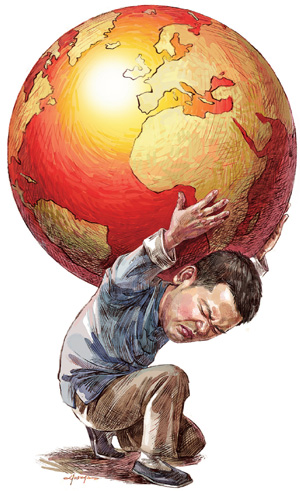Questioning China's real achievements
Sinologist's views unleash debate about the country's place in the world and how far it will finally advance
|
 |
|
LI MIN/CHINA DAILY |
Is China emerging as a potential global superpower or just a partial one? The leading American Sinologist David Shambaugh makes the case in his new book, China Goes Global: The Partial Power, that despite being the world's second-largest economy, the country has a long way to go before it begins to shape the world in its own image.
Even in the economic sphere, where China arguably had its most significant influence — accounting for 40 percent of global growth over the past two decades as well as being the largest exporter and holder of foreign exchange reserves — its global reach is overstated, according to Shambaugh.
The American academic argues that while the image is of Chinese companies taking over businesses throughout Europe and the United States, China has only the fifth largest overseas direct investment in the world, behind even the Netherlands and a fifth of the size of that of the United States.
He further points out that while China may have 71 companies in the Fortune 500 only three of them are truly multinational, gaining more than 50 percent of their revenues from overseas.
China, according to the professor of political science and international affairs at George Washington University, is also a "cautious diplomatic actor", using diplomacy mainly as a tool to serve its own economic modernization and national security and not for any wider goals.
"China has a very long way to go before it becomes — if it ever becomes — a true global power. And it will never ‘rule the world'," he argues.
The book, coming from one of the West's leading Sinologists, is already fueling a debate about China's current and future role in the world.
Some in China insist it has never been China's intention to be a world superpower and that its sudden economic advancement has put it in a position of having to have a global role it never really sought in the first place.
Many believe Shambaugh also fails to give sufficient credit for the long and difficult journey China has taken since reform and opening-up began under Deng Xiaoping in the late 1970s.
In his book, the American Sinologist seems to take the polar opposite stance of the British academic Martin Jacques, who in his international bestseller When China Rules the World postulated that in the 21st century it might be China that defines modernity and not the United States.
Speaking from Kuala Lumpur, Jacques says the book is more about where China is now than where it is heading.
"It is a still photo. As a snapshot of the present he has got a lot to say and he has some very reasonable arguments but he underplays the scale of China's achievement.
"Where he really does underestimate China's strength is in the whole economic field. China is an absolutely crucial player and has become an important source of demand in the world not just for commodities but as a major consuming market in its own right.
"He talks of the number of Chinese companies in the Fortune 500 but if you look at how many companies there used to be in the list it has been such a huge change."
Paul M. Cheng, the Hong Kong politician and businessman, speaking from Hawaii, also believes Shambaugh has taken a snapshot and underestimates the global impact Chinese companies are likely to have over the next 10 to 15 years.
The author of On Equal Terms: Redefining China's Relationship with America and the West, another book that examined China's role in the world, says China's fast developing private equity market in Hong Kong, Shanghai and Shenzhen will give Chinese companies huge financial firepower to make acquisitions around the world.
They will be then be able to acquire the innovation capability and global brands that Shambaugh says the China economy now lacks.
"It is a fast track way for Chinese companies to do this. You can criticize them for not being able to do it themselves but from a business point of view it really makes no difference," he says.



















